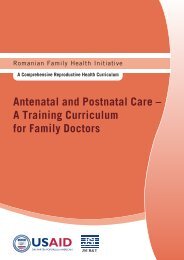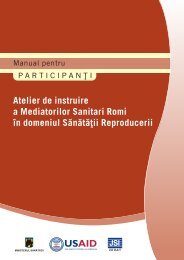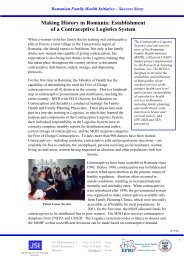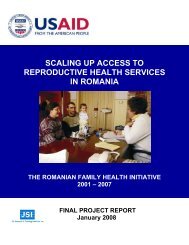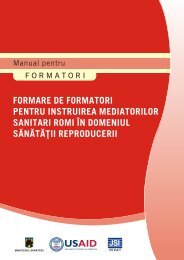Training of Roma Health Mediators in Reproductive Health
Training of Roma Health Mediators in Reproductive Health
Training of Roma Health Mediators in Reproductive Health
Create successful ePaper yourself
Turn your PDF publications into a flip-book with our unique Google optimized e-Paper software.
• For health problems like cancer or a reproductive tract <strong>in</strong>fection, it is important to<br />
get treated right away. Often early treatment can cure a disease before it becomes<br />
more serious or life threaten<strong>in</strong>g.<br />
• For diseases that cannot be cured, there are <strong>of</strong>ten treatments that slow down the<br />
progression <strong>of</strong> the disease or lessen the severity <strong>of</strong> symptoms.<br />
• When teach<strong>in</strong>g women about breast self-exams, it is important to assess what they<br />
know and believe about the self-exam. To do this, f<strong>in</strong>d out:<br />
o Whether women have ever done a self-exam before<br />
o How they feel about touch<strong>in</strong>g themselves<br />
o Whether the fear <strong>of</strong> detect<strong>in</strong>g a problem is an obstacle to self-observation<br />
Then, tailor your educational session to meet the needs <strong>of</strong> the particular <strong>in</strong>dividual or<br />
group you are teach<strong>in</strong>g.<br />
II.<br />
CERVICAL CANCER (15 m<strong>in</strong>utes)<br />
Expla<strong>in</strong> that:<br />
• The uterus (womb), like others organs <strong>in</strong> the body, can be afflicted with cancer.<br />
The cervix is the most frequently affected.<br />
• In general, cervical cancer is found <strong>in</strong> older women (over age 40), although it can<br />
occur <strong>in</strong> younger women, sometimes even less than 30 years <strong>of</strong> age.<br />
• Although any woman can develop cervical cancer, some women are more likely<br />
to develop it than others:<br />
o Women who have had certa<strong>in</strong> sexually transmitted <strong>in</strong>fections (such as warts,<br />
genital herpes)<br />
o Women who have begun sexual activity very young (under the age <strong>of</strong> 17)<br />
o Women who have delivered their first child under the age <strong>of</strong> 20<br />
o Women who have had multiple partners.<br />
• The diagnosis <strong>of</strong> cervical cancer is relatively easy to do and the disease can be<br />
detected <strong>in</strong> very early stages which allows timely treatment and cure.<br />
• Cervical cancer may be prevented by regular check-ups and screen<strong>in</strong>g<br />
exam<strong>in</strong>ation (Pap test) which can be performed even at the primary health level <strong>of</strong><br />
care. If possible, women should have exam<strong>in</strong>ations and screen<strong>in</strong>g tests every 2-3<br />
years even they are hav<strong>in</strong>g no problem and are feel<strong>in</strong>g f<strong>in</strong>e.<br />
Ask participants:<br />
‣ What are the signs that could <strong>in</strong>dicate a dangerous problem with the reproductive<br />
organs (<strong>in</strong>clud<strong>in</strong>g genital cancer)?<br />
• Unexpla<strong>in</strong>ed, prolonged, frequent bleed<strong>in</strong>g from the vag<strong>in</strong>a<br />
• Pa<strong>in</strong> dur<strong>in</strong>g sexual <strong>in</strong>tercourse<br />
• Constant pa<strong>in</strong> <strong>in</strong> the pelvis<br />
• Bleed<strong>in</strong>g start<strong>in</strong>g aga<strong>in</strong> after the woman’s menstrual periods have stopped for a<br />
year or more (menopause)<br />
183<br />
RFHI/JSI <strong>Roma</strong>nia <strong>Tra<strong>in</strong><strong>in</strong>g</strong> <strong>of</strong> RHMs <strong>in</strong> <strong>Reproductive</strong> <strong>Health</strong> Session 12: Breast and Cervical Cancer



